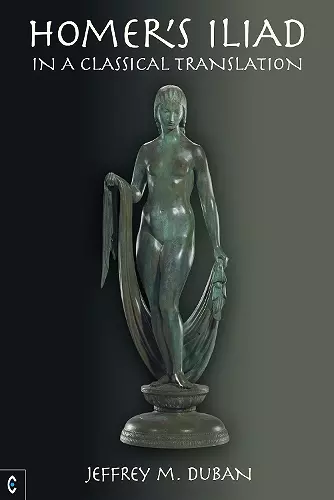Homer's Iliad in a Classical Translation
Jeffrey M Duban translator Jeffrey M Duban editor
Format:Hardback
Publisher:Clairview Books
Published:5th May '25
Should be back in stock very soon

The Iliad presents superhuman heroes and superhuman rage, brutal death, unbounded sorrow, the craving for revenge, the shortness of life, the glory quest, and, ultimately, reconciliation and forgiveness. As human nature is unchanging, the Iliad's themes concern us as much today as they did Homer's audiences 2,700 years ago. Not for nothing did Ezra Pound observe that "a civilization was founded on Homer."
The Iliad is always relevant, even as it is timeless. Of interest to readers in every generation, it is a classic in the root sense. Homer was "the Bible of the Greeks." He was their mythology and history (still fairly merged at the time), their religion, their storehouse of ethics and exempla under an Olympian dispensation. And while the Odyssey is the more popular of Homer's epics, the Iliad is the more profound.
This is not merely another new translation of Homer's Iliad. It is sooner and foremost Homer's Iliad in a Classical Translation - the first-ever into a consistently 12-syllable line and, at the same time, the longest such work in the English language (the Iliad consisting of 15,639 lines in Greek). This translation by Jeffrey M. Duban uses a mildly archaizing style and other poetic devices to suggest the antiquity and flavor of Homeric composition. Like the original, it is both alliterative and polysyllabic - excessive monosyllabism the scourge of many a modern translation. Duban further observes epic decorum with recourse to poetic diction. Decorum entails the avoidance of colloquialisms and commonplaces, again in contrast to other translations.
This special limited edition hardback features a high-quality binding with an embossed finish, jacket, headbands and printed endpapers.
'Duban does not believe in plainness or simplicity, in part because he sees himself as fighting against an impoverished contemporary literary culture that has simplified language for all the wrong reasons. Also, he regards self-conscious archaism as an essential feature of Homer’s epic poetry and thinks it important to remind English readers of this feature.
The qualities of his Iliad translation are difficult to demonstrate succinctly. This is in part because he has created a kind of performance text that is meant to be read out loud, or recited from memory, so that the insistent rhythm of the verse appears to drive the narrative forward. To read Duban’s Iliad silently on the page is to miss this essential element of what he has tried to create. He is perhaps at his best when rendering Homeric speeches into English. In such passages his innate sense of drama shines through.
This translation is a faithful attempt to replicate the Iliad as it sounds inside Duban’s head. For all its scholarly apparatus, this is a deeply personal project. Readers who persist all the way to the end will come to feel that they know Jeffrey Duban at least as well as they do Homer or his Iliad. He has put his whole self into the introduction and commentary as well as the verse, and the depth of emotion throughout seems palpable.'
– Jaspreet Singh Boparai, "Fragments Against the Ruins," Quillette
ISBN: 9781912992652
Dimensions: unknown
Weight: unknown
672 pages